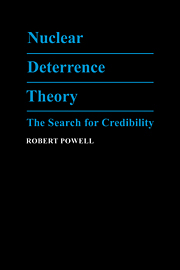
-
Select format
-
- Publisher:
- Cambridge University Press
- Publication date:
- 13 October 2009
- 30 March 1990
- ISBN:
- 9780511551598
- 9780521375276
- 9780521063999
- Dimensions:
- (228 x 152 mm)
- Weight & Pages:
- 0.478kg, 240 Pages
- Dimensions:
- (234 x 156 mm)
- Weight & Pages:
- 0.342kg, 240 Pages
You may already have access via personal or institutional login
Book description
Applying advances in game theory to the study of nuclear deterrence, Robert Powell examines the foundations of deterrence theory. Game-theoretic analysis allows the author to explore some of the most complex and problematic issues in deterrence theory, including the effects of first-strike advantages, limited retaliation, and the number of nuclear powers in the international system on the dynamics of escalation. With the formalizations he develops, the author is able to demonstrate the fundamental similarity of the two seemingly disparate deterrrent strategies that have evolved in response to the nuclear revolution and the condition of mutually assured destruction: the strategy of limited retaliation. The author argues that the logic underlying both strategies centres on a search for ways to make the use of force or the threat of its use credible when any use of force might escalate to mutual devastation.
Reviews
"...the most serious and most productive application of the formal game theory to the study of deterrence and the outbreak of war...this is the first book-length treatment I have seen that makes successful use of game theory in exploring the most elusive aspects of this subject." Thomas Schelling, author of The Strategy of Conflict
Contents
Metrics
Altmetric attention score
Full text views
Full text views help Loading metrics...
Loading metrics...
* Views captured on Cambridge Core between #date#. This data will be updated every 24 hours.
Usage data cannot currently be displayed.
Accessibility standard: Unknown
Why this information is here
This section outlines the accessibility features of this content - including support for screen readers, full keyboard navigation and high-contrast display options. This may not be relevant for you.
Accessibility Information
Accessibility compliance for the PDF of this book is currently unknown and may be updated in the future.


